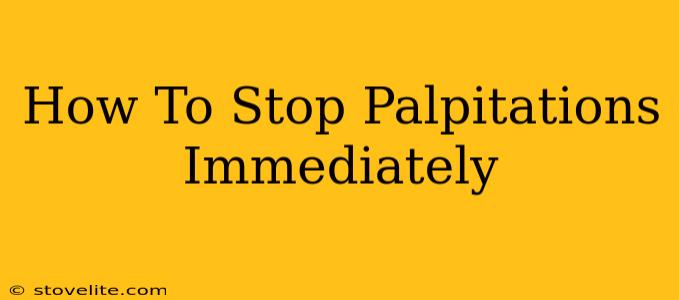Heart palpitations – that unsettling feeling of a racing, fluttering, or pounding heart – can be alarming. While they're often harmless, knowing how to stop palpitations immediately can provide significant relief and reduce anxiety. This guide explores several effective techniques you can use to manage palpitations at home.
Understanding Heart Palpitations
Before diving into solutions, let's briefly understand what causes palpitations. They can stem from various factors, including:
- Stress and Anxiety: This is a common trigger, as stress hormones can accelerate your heart rate.
- Caffeine and Alcohol: These stimulants can overstimulate your heart.
- Dehydration: Lack of fluids can affect your blood volume, leading to palpitations.
- Medications: Certain medications have heart palpitations as a side effect.
- Underlying Medical Conditions: In rare cases, palpitations can signal a more serious heart condition.
Important Note: While the techniques below offer immediate relief, persistent or severe palpitations warrant a visit to your doctor for proper diagnosis and treatment. This guide is for informational purposes only and should not replace professional medical advice.
Immediate Actions to Stop Palpitations
When a palpitation episode hits, try these techniques:
1. Breathe Deeply and Slowly
Deep, controlled breathing is your first line of defense. Practice the following:
- Diaphragmatic Breathing: Place one hand on your chest and the other on your stomach. Inhale deeply through your nose, feeling your stomach rise. Exhale slowly through your mouth, feeling your stomach fall. Focus on slow, even breaths.
- Box Breathing: Inhale for four seconds, hold for four seconds, exhale for four seconds, and hold for four seconds. Repeat this cycle several times.
This technique helps regulate your nervous system and slow your heart rate.
2. The Valsalva Maneuver (Use with Caution)
The Valsalva maneuver involves holding your breath while bearing down, as if you're having a bowel movement. This temporarily increases pressure in your chest, which can slow your heart rate. However, use this technique cautiously and sparingly, as it can be risky for individuals with certain heart conditions. Consult your doctor before trying this.
3. Hydration
Quickly drink a glass of water. Dehydration can contribute to palpitations, so restoring fluid balance can offer relief.
4. Change Your Posture
Try changing your posture. Sitting or lying down can sometimes help alleviate palpitations. Avoid strenuous activities that may worsen the symptoms.
5. Address Underlying Triggers
If you know certain triggers, such as caffeine or stress, try to avoid or manage them. This preventative approach can minimize future palpitations.
Long-Term Strategies for Managing Palpitations
While the above techniques offer immediate relief, addressing the root cause is crucial for long-term management. Consider these strategies:
- Stress Management: Incorporate stress-reducing techniques into your daily routine, such as yoga, meditation, or deep breathing exercises.
- Dietary Changes: Limit caffeine and alcohol intake.
- Regular Exercise: Engage in regular physical activity to improve your cardiovascular health.
- Medication Review: If you suspect medication side effects, consult your doctor.
When to Seek Medical Attention
While many palpitations are benign, it's important to seek immediate medical attention if you experience:
- Severe or prolonged palpitations
- Chest pain or discomfort
- Shortness of breath
- Dizziness or lightheadedness
- Fainting
By understanding the causes and employing these techniques, you can effectively manage and reduce the frequency and intensity of your heart palpitations. Remember, consulting your doctor is vital for proper diagnosis and personalized treatment plans.

